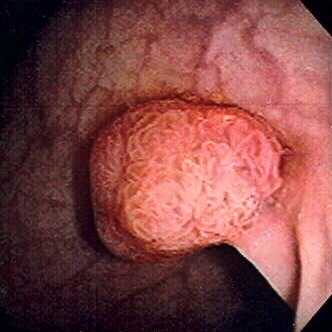Playlist
Show Playlist
Hide Playlist
Colorectal Cancer (CRC) in Women
-
Slides Breast and Colorectal Cancer Screening.pdf
-
Download Lecture Overview
00:00 Let's now talk about colorectal cancer. 00:03 Colorectal cancer is a second leading cause of death among men and women in the United States, and it's the third leading cancer death among women alone. 00:11 Screening in the average population starts at 45 years old ACOG, which is the American College of Obstetricians and Gynecologists recommend that colonoscopy be done every 10 years as the preferred screening method in women at average risk, but other screening options are available. 00:29 Let's now talk about an increased risk population. 00:32 These are patients who have a personal history of colorectal cancer or polyps. 00:39 A family history of polyps or colorectal cancer in one or more first-degree relatives can also increase your risk. 00:46 And colorectal cancer in 2 or more second-degree relatives does also put you at risk. 00:52 And now I'd like address a high risk population. 00:56 These are women who are at increased risk of developing colorectal cancer. 01:00 If you have a personal history of IBD or inflammatory bowel disease such as ulcerative colitis or Crohn's disease, this is a significant risk factor for CRC. 01:10 If you have a personal or family history of FAP or HNPCC or Lynch syndrome, these patients need to be screened earlier. 01:20 Women with HNPCC are also at risk for endometrial, ovarian, and other related cancers. 01:26 Of note, endometrial cancer sometimes is the most common early presentation of cancer in the HNPCC syndrome. 01:34 Now I would like to talk about the lifestyle factors associated with colorectal cancer. 01:39 These are modifiable lifestyle factors that the patient can stop and it will decrease their risk overall of cancer. 01:46 While most patients think that smoking is only related to lung cancer, it's definitely a risk factor for colorectal cancer and they can stop. 01:54 Lack of physical activity and regular exercise is also associated with colorectal cancer. 02:00 Too much alcohol intake can also lead to potential increased risk of colorectal cancer. 02:06 Red and processed meats have been implicated in colorectal cancer as well as obesity which is a common phenomenon in the United States. 02:16 Let's now talk about some of the symptoms that a patient may experience if they have colorectal cancer. 02:23 These are important to ask during a typical history, however, you may see these as red flags during some of your examination questions while you're taking the USMLE. 02:34 A change in bowel habits is almost pathognomonic for colorectal cancer. 02:39 Bleeding from the rectum or blood in the stool is very worrisome, so if you see that in the question think colorectal cancer. 02:47 Stools that become narrower than usual are abnormal and can be a symptom of colorectal cancer. 02:53 New abdominal discomfort, bloating, cramps, and frequent gas pain can also be a presenting symptom. 03:00 Loss of appetite and unexplained weight loss are often included in USMLE question. 03:05 Weakness and fatigue is a nonspecific symptom but can also go along with the other symptoms I've already listed. 03:12 Unexplained anemia, especially in the postmenopausal women is thought to be colorectal cancer until proven otherwise. 03:19 Let's now review what we've discussed. 03:23 Remember to integrate risk assessment tools when screening for breast cancer. 03:27 Encourage patients to be breast self aware and remember that Ashkenazi Jewish women are increased risk of being BRCA1 and 2 carriers. 03:37 African Americans have a higher incidence and mortality from colorectal cancer than average and encourage your patients to be screened. 03:46 Thank you and good luck on your exam.
About the Lecture
The lecture Colorectal Cancer (CRC) in Women by Lynae Brayboy, MD is from the course Menopause.
Included Quiz Questions
Which of the following women does NOT have an increased risk of developing colorectal cancer?
- A patient who has a first-degree relative with inflammatory bowel disease.
- A patient with a previous history of colorectal cancer.
- A patient with adenomatous polyps.
- A patient who has a family history of adenomatous polyps or cancer in one or more first-degree relatives.
- A patient who has a family history of colorectal cancer in 2 or more of the second-degree relatives.
Which of the following pathologic findings is NOT associated with an increased risk of development of colorectal cancer?
- Juvenile polyp
- Crohn disease
- Familial adenomatous polyposis
- Hereditary nonpolyposis colorectal cancer
- Inflammatory bowel disease
Which of the following is NOT a common lifestyle risk factor associated with colorectal cancer?
- High-fiber diet
- Smoking
- Lack of exercise
- Alcohol intake
- Obesity
Customer reviews
5,0 of 5 stars
| 5 Stars |
|
5 |
| 4 Stars |
|
0 |
| 3 Stars |
|
0 |
| 2 Stars |
|
0 |
| 1 Star |
|
0 |




